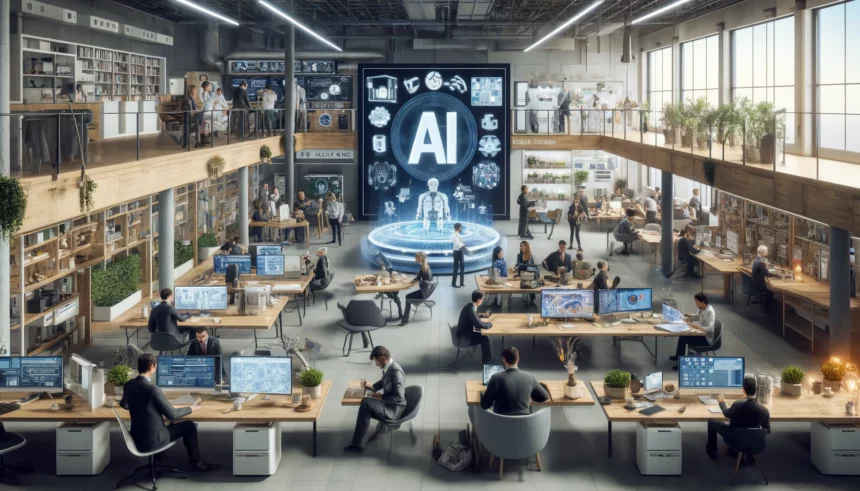In the past few years, technology has revolutionized our work environment. From AI to cloud-based solutions, the tools we use today have significantly changed how we perform tasks, collaborate, and balance work and life. Here’s a look at 15 major trends reshaping our professional landscape.
Contents
AI and the Four-Day WorkweekMobile Computing and Flexible WorkCollaboration Platforms and Cloud SolutionsAI Boosts Satisfaction and ProductivityIncreased Cybersecurity Demandse-Learning and Skill DevelopmentPromoting Diversity, Equity, and Inclusion (DEI)Work-Life Balance: A Double-Edged SwordShifting Leadership StylesEmbracing Hybrid WorkImpact on Mental HealthFuture Expectations: AR, MR, and VRThe Metaverse and CollaborationAutomation, AI, and Job TransformationSoft Skills and Emotional Intelligence
AI and the Four-Day Workweek
- AI Enhances Productivity: AI tools have improved productivity, allowing tasks to be completed more efficiently.
- Support for Shorter Workweeks: With AI handling routine tasks, 90% of AI-powered companies are open to a four-day workweek, compared to only 41% of non-AI companies.
Mobile Computing and Flexible Work
- Anywhere, Anytime Work: Mobile devices untether employees from traditional office settings.
- Real-Time Collaboration: Workers can now collaborate in real-time, no matter where they are, leading to increased job satisfaction.
Collaboration Platforms and Cloud Solutions
- Streamlined Communication: Tools like Slack and Teams keep everyone connected and informed.
- Centralized Data Access: Cloud storage allows easy access to shared resources, making project management more efficient.
AI Boosts Satisfaction and Productivity
- More Engaging Work: AI reduces mundane tasks, letting employees focus on strategic and creative work.
- Higher Job Satisfaction: 59% of employees feel more satisfied with their jobs when AI is involved.
Increased Cybersecurity Demands
- Heightened Security Risks: Advanced technology means more sophisticated cyber threats.
- Proactive Cybersecurity Measures: IT teams must constantly update security protocols to protect against these threats.
e-Learning and Skill Development
- Flexible Training Options: Online learning platforms offer a wide range of courses accessible from anywhere.
- Self-Paced Progression: Employees can learn at their own pace, tailoring their education to their specific needs.
Promoting Diversity, Equity, and Inclusion (DEI)
- Inclusive Work Conditions: Digital tools help create flexible work environments that support diverse needs.
- Remote and Adaptive Work: Video conferencing and adaptive technologies enable more people to participate in the workforce fully.
Work-Life Balance: A Double-Edged Sword
- Increased Flexibility: Technology allows for remote work and flexible schedules.
- Blurred Boundaries: The downside is the potential for longer hours and constant availability, leading to burnout.
Shifting Leadership Styles
- Adapting to New Tools: Managers must embrace continuous learning and digital literacy.
- Flexible Leadership: Leaders need to foster a culture that is agile and responsive to technological innovations.
Embracing Hybrid Work
- Bridging Remote and On-Site Work: Tools like video conferencing and cloud platforms support hybrid work models.
- Flexible Scheduling: Employees can book desks and manage their work hours more effectively.
Impact on Mental Health
- ‘Always-On’ Culture: The expectation to always be available can lead to stress and anxiety.
- Mental Health Risks: Continuous connectivity increases the risk of burnout.
Future Expectations: AR, MR, and VR
- Immersive Training: AR, MR, and VR will revolutionize how employees learn and interact.
- Enhanced Collaboration: These technologies will enable more realistic virtual meetings and brainstorming sessions.
The Metaverse and Collaboration
- Virtual Workspaces: The metaverse will create immersive environments for e-learning and collaboration.
- Enhanced Presence: Employees will feel more connected in virtual meetings.
Automation, AI, and Job Transformation
- New Job Landscape: By 2030, many jobs will be new, created by advancements in automation and AI.
- Human-Centric Roles: Jobs will focus more on creativity, problem-solving, and critical thinking.
Soft Skills and Emotional Intelligence
- Valuing Human Skills: As technology handles technical tasks, soft skills and emotional intelligence become crucial.
- Empathy and Communication: Effective communication and empathy will set employees apart in a tech-driven world.
Technology continues to evolve, changing the way we work in profound ways. Embracing these shifts can lead to more productive, satisfying, and inclusive work environments, provided we address the accompanying challenges effectively.
















